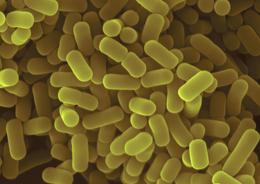Symbiotic organisms influence fruitfly mate choice.

Lactobacillus plantarum may be speeding the speciation of their hosts.
PhotolibraryBacteria that live on the fruitfly Drosophila melanogaster can affect their host's choice of mate by altering the fly's pheromones, a new study suggests. That change in mate choice could in turn lead to the evolution of new fly species — suggesting that bacteria can indirectly change the species of their hosts.
When microbiologist Gil Sharon, at Tel-Aviv University in Israel, and his colleagues raised some fruitflies on molasses and others on starch, they expected — on the basis of previous studies — that the flies would mate preferentially with partners raised on the same diet, and the flies did. However, why the flies showed a preference for mates that shared the same diet was unknown.
Eugene Rosenberg, also a microbiologist at Tel-Aviv University and part of the team that worked on the study, suspected that a change in diet acts on symbiotic bacteria living on the flies, rather than directly on the flies themselves. "This adds weight to the idea that bacteria have an important role in the evolution of animals and plants," he says.
The findings, published this week in Proceedings of the National Academy of Sciences1, are consistent with 'hologenome' theory — first proposed by Rosenberg and his wife, fellow evolutionary biologist Ilana Zilber-Rosenberg, in 20082. The theory suggests that natural selection, which drives evolution, acts on a host and its symbiotic partners as a single unit rather than on each species in isolation.
The fruitflies developed a mating preference just a single generation after they were introduced to a new diet. The effect was seen to last for 37 generations. "It's a very rapid and long lasting effect," says Mike Ritchie, an evolutionary biologist at the University of St Andrews, UK, who also works on Drosophila, "so it could influence speciation."
Bacterial control
To confirm that it was the bacteria that were influencing fly mating behaviour — and not simply the flies themselves changing their behaviour in response to their diet — the researchers treated the flies with antibiotics, wiping out the bacteria that live on them. They then tested the flies again and found that they mated randomly — rather than showing a preference for same-diet partners — indicating that the bacteria were influencing mate choice.
"If you change the diet, then some of the bacteria in the gut will multiply more than others and this will change the hologenome, the sum of the genes," says Rosenberg.
By looking at genetic fingerprints, the researchers identified the bacterial species responsible, Lactobacillus plantarum. In flies fed on a diet of starch L. plantarum made up 26% of their symbiotic bacteria, compared with just 3% on molasses-fed flies. To confirm that L. plantarum was responsible, antibiotic-treated flies were re-infected with the bacterium, and seen to return to preferential mating behaviour.
The team then examined fly pheromones — chemicals that affect the behaviour of other members of the same species. Although Rosenberg says that the results are not yet conclusive, the researchers found that the starch-fed flies had altered levels of some pheromones known to be involved in mating behaviour. "There's a hint from analytical data that they are altering the sexual pheromones, but this really has to be looked at more closely," he says.
Ritchie says the work could open up whole new avenues of study. "We know that plant-eating flies show very high speciation rates," he says. "This could be a general mechanism."
Rosenberg says the next step is to investigate whether this mechanism is occurring in natural fruitfly populations, and to pin down how the bacteria are passed from one generation to the next.
References
- Sharon, G. et al. Proc. Natl Acad. Sci. USA advance online publication doi:10.1073/pnas.1009906107 (2010).
- Zilber-Rosenberg, I. & Rosenberg, E. FEMS Microbiol. Rev. 32, 723-735 (2008). | Article | PubMed | OpenURL
- http://www.nature.com/news/2010/101101/full/news.2010.575.html
Nenhum comentário:
Postar um comentário